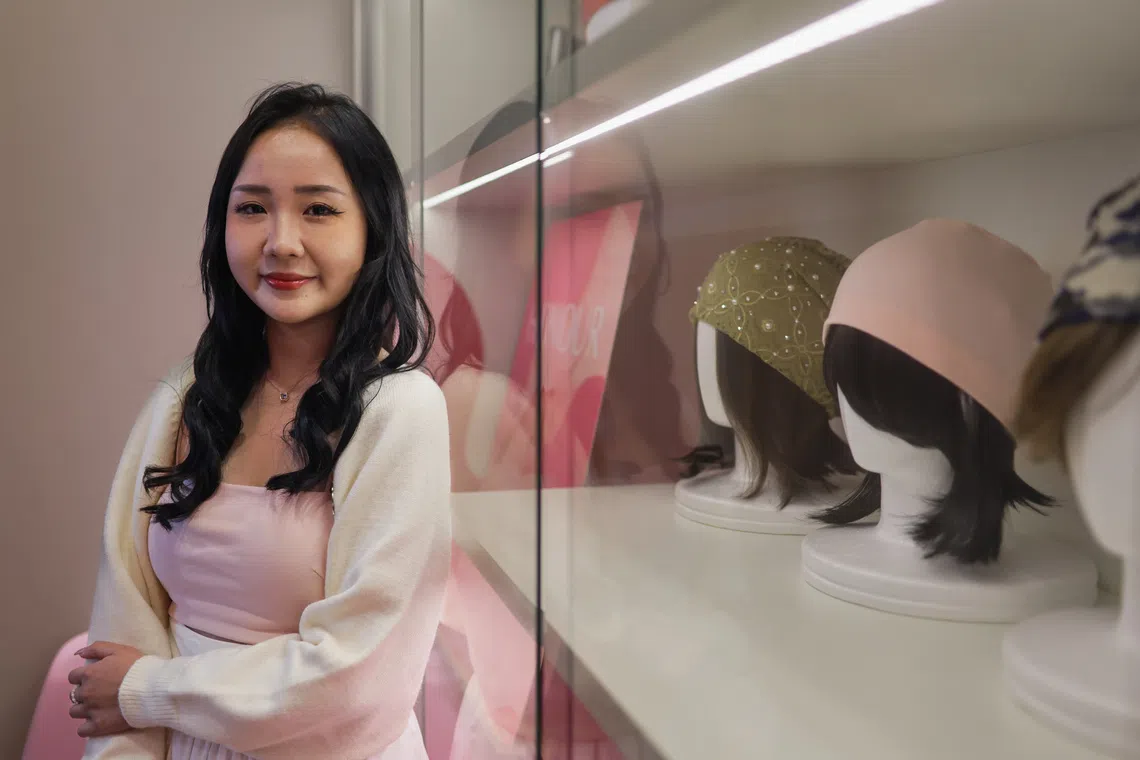9 in 10 young women in S’pore not taking active steps to safeguard breast health: Poll
Sign up now: Get tips on how to grow your career and money

Financial adviser Jamie Ng was diagnosed with stage 2 triple negative breast cancer three years ago. Now cancer-free, she helps out at the Breast Cancer Foundation as a befriender.
PHOTO: ST FILE
Follow topic:
SINGAPORE – Ms Jamie Ng was flourishing in her career in the fashion industry, with a degree under her belt and a stable job, when she found out three years ago that she had breast cancer.
She was just 23.
When she received her medical diagnosis – stage 2 triple negative breast cancer – she felt like everything came to a pause and her life had gone off the rails.
Ms Ng said: “My mind just went blank... The doctors told me it was the most aggressive form of breast cancer
The first sign of cancer emerged on Feb 1, 2022, when Ms Ng was lying on her side and felt sharp pain every now and then near her left breast.
She began massaging the area, hoping to ease the pain, and that was when she felt a small, quail egg-size lump.
“Before the pain, I did not know it was there at all,” she said.
She was diagnosed with cancer the same month, and underwent a double mastectomy in August 2022, right about the time she turned 24.
Now 27 and cancer-free, Ms Ng has switched jobs and is a financial adviser.
In her spare time, she helps out at the Breast Cancer Foundation (BCF) as a befriender to support others battling the disease.
She said: “Breast cancer can happen to anyone at any time. It doesn’t discriminate based on age or wait until you are financially sound.”
Her one niggle was not knowing about conducting her own breast self-examination earlier.
A new poll has found that nine in 10 young women today are not taking active steps for their breast health. However, almost half of them associate self-examination and monitoring changes with breast health.
This is among the key findings published in a BCF report called A Study In Pink: Young Women And Breast Cancer.
The report is based on a survey of 800 women in Singapore aged between 18 and 40, and aims to better understand perceptions towards breast cancer among young women, a demographic often overlooked in breast health discussions.
BCF, a social service agency, was established in 1997 to provide support for the breast cancer community, and raises awareness on the importance of early detection of the disease.
The survey, carried out as part of efforts to mark Breast Cancer Awareness Month in October, was done in partnership with The Estee Lauder Companies and Gilead Sciences.
In a joint statement on Oct 8, the three organisations highlighted three other key findings from the survey.
First, there is a gap between awareness of breast cancer and knowledge about the disease among the public. Second, the cost of treatment can be a barrier to safeguarding breast health. Third, there is a willingness to talk and learn more about the disease.
The survey found that although 70 per cent of young women knew that breast cancer can be detected early, only 22 per cent knew what to look out for.
Nearly 40 per cent admitted to lacking knowledge in the topic, and only 14 per cent knew how to conduct a self-examination.
Cost of treatment was the top fear for 56 per cent of respondents, compared with mastectomy for 29 per cent, and mortality for 27 per cent. Only a third believed they had enough financial coverage for preventive care.
Affordable screening was the most popular initiative, with 54 per cent of respondents asking for it.
Ninety-four per cent of respondents said they wish people were more comfortable discussing breast health, and more than a third already feel ready to do so.
Forty-five per cent of respondents, however, cited uncertainty as a barrier to begin taking steps for their breast health, and want clearer guidance on what to do.
BCF general manager Jacob Soo said: “The findings remind us that awareness alone is not enough; true progress begins with health literacy, early action and accessible support.
“Awareness is high; the know-how and confidence to act are not. Busy lives, a fear of ‘finding something’ and uncertainty about what’s right at their age all get in the way.”
In line with these findings, BCF said it is stepping up efforts to support and engage younger women.
One example is the Young Women’s Networking Initiative, a peer-support platform that connects young survivors and at-risk women in their 20s and 30s.
BCF will also introduce more tailored education programmes and expand outreach initiatives in schools and workplaces.
On Oct 11, BCF hosted its annual flagship event, the Pink Ribbon Walk 2025, at OCBC Square in Kallang.
“We want this generation, and the next, to feel informed, confident and supported to act early for themselves, and for the women who will follow,” said Mr Soo.
More information on BCF’s programmes is available at www.bcf.org.sg

